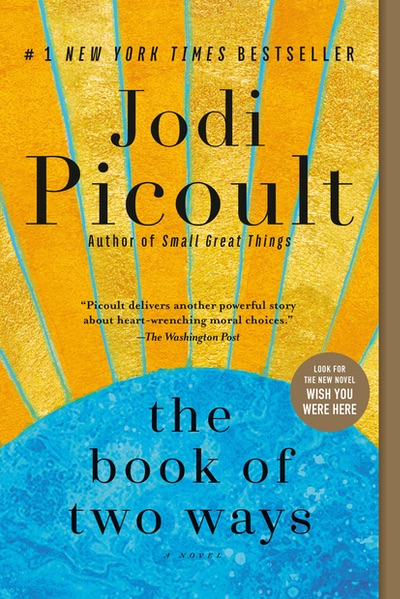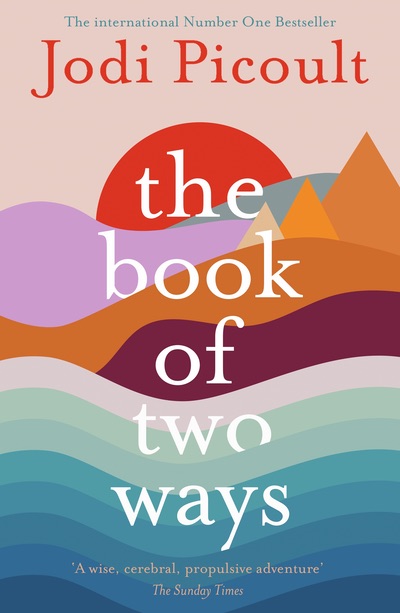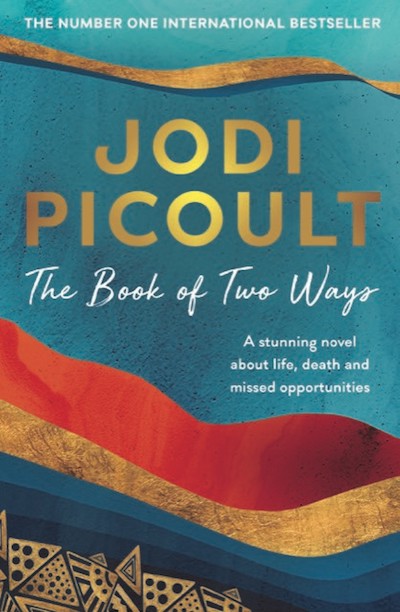
The paperback edition of THE BOOK OF TWO WAYS is now available for purchase! It includes a Q&A with Jodi and Jojo Moyes plus an excerpt from WISH YOU WERE HERE!
Download the “Book Club Kit”: Letter from the Author, Discussion questions for your book club (or for you to ponder on your own!), Cocktails and Photos from Jodi’s trip to Egypt
Printable discussion questions »Everything changes in a single moment for Dawn Edelstein. She’s on a plane when the flight attendant makes an announcement: prepare for a crash landing. She braces herself as thoughts flash through her mind. The shocking thing is, the thoughts are not of her husband, but a man she last saw fifteen years ago: Wyatt Armstrong.
Dawn, miraculously, survives the crash, but so do all the doubts that have suddenly been raised. She has led a good life. Back in Boston, there is her husband, Brian, her beloved daughter, and her work as a death doula, where she helps ease the transition between life and death for her clients .
But somewhere in Egypt is Wyatt Armstrong, who works as an archaeologist unearthing ancient burial sites, a job she once studied for, but was forced to abandon when life suddenly intervened. And now, when it seems that fate is offering her second chances, she is not as sure of the choice she once made.
After the crash landing, the airline ensures the survivors are seen by a doctor, then offers transportation wherever they want to go. The obvious option for Dawn is to continue down the path she is on and go home to her family. The other is to return to the archaeological site she left years before, reconnect with Wyatt and their unresolved history, and maybe even complete her research on The Book of Two Ways--the first known map of the afterlife.
As the story unfolds, Dawn’s two possible futures unspool side by side, as do the secrets and doubts long buried beside them. Dawn must confront the questions she’s never truly asked: What does a life well-lived look like? When we leave this earth, what do we leave behind? Do we make choices...or do our choices make us? And who would you be, if you hadn’t turned out to be the person you are right now?
#TBOTW debuted instantly #1 as a NYT bestseller!
Similar to Alice Hoffman’s depiction of complex family ties, Picoult’s latest stretches the importance of recognizing our bonds to those we love. Highly recommended for open-minded readers.
A thrilling adventure . . . With Picoult’s stories, there is always something new to learn, and The Book of Two Ways is no exception. . . . A fun and interesting read, one that will lead readers to both learn a lot and also ask themselves key questions about how to create happy lives for themselves during the short time we have on earth.
The Book of Two Ways is a return for Picoult to the themes of her earliest books—motherhood, complicated romantic love. . . . Picoult, at this point in her career, could skillfully build tension in a broom closet, but the best part of this book is not the suspense; it’s the look at the complexity of a woman as she enters middle age. . . . [Picoult] always tells both sides of a story not with judgment, but with grace.
Jodi Picoult fans rejoice! . . . The Book of Two Ways is one story you won’t be able to put down
Asking life or death questions in perfect Picoult fashion.
[A] delightfully escapist, high-concept novel… The Book of Two Ways nearly spills over in its earnestness and emotion. This is a book of big, burning questions such as what defines a great life.
Picoult’s fans will appreciate this multifaceted, high concept work.
Picoult’s fans will be more than ready for this puzzle of a novel . . .[they] will find heady themes to consider.
Jodi Picoult knows how to write allll the feels, and The Book of Two Ways is no exception.
Unputdownable.
Riveting.
If you didn’t already see Jodi’s name and order this one, let us convince you.
Picoult has certainly crafted a fun and interesting read, one that will lead readers to both learn a lot and also ask themselves key questions about how to create happy lives for themselves during the short time we have on earth.
How many of us have looked back on a decision that changed our lives and wondered: what if we had made a different choice? Picoult’s novel THE BOOK OF TWO WAYS digs into this very question and the result is incredibly thought-provoking. Dawn Edelstein was once a young grad student working on a dig in Egypt, in love with a fellow Egyptologist, and getting ever closer to proving a radical new theory about ancient Egyptians’ burial rituals for the road to the afterlife. Then a phone call from home changed everything. Fifteen years later, Dawn is married, with a teenage daughter, and working in Boston as a death doula, helping the dying prepare to leave this world in the best way possible. When Dawn has a near-death experience she is confronted with the question of whether the good life she has could have been a great one. Dawn doesn’t just ponder the question—she returns to Egypt, and the man she once loved, to see if she can find the answer. Picoult incorporates fascinating details about Egyptology into her novel—the title comes from an ancient Egyptian tome of the same name—bringing history and a universal connection into the story. The Book of Two Ways is a provocative exploration into monumental questions: about the life we are living, who we want to be with when we die, and whether it’s possible—and acceptable—to change our mind, return to the trailhead, and go another way.

Order your copy now!
The paperback edition is now available! It includes a Q&A with Jodi and Jojo Moyes plus an excerpt from WISH YOU WERE HERE!

To do research for THE BOOK OF TWO WAYS I spent a few weeks in Egypt, learning from one of the foremost Egyptologists in the US: Dr. Colleen Darnell. Here are some photos from my journey that directly reflect moments in the book!
In my novel, Wyatt and Dawn are working in Deir el-Bersha in tombs much like these.
When my phone alarm chimes, I fish it out from the pocket of my cargo pants. I’ve forgotten, with the time change, to turn off the reminder. I’m still groggy with sleep, but I open the date and read thenames: Iris Vale. Eun Ae Kim. Alan Rosenfeldt. Marlon Jensen.
I close my eyes, and do what I do every day at this moment: I remember them.
Iris, who had died tiny and birdlike, had once driven a getaway car for a man she loved who’d robbed a bank. Eun Ae, who had been a doctor in Korea, but couldn’t practice in the United States. Alan had proudly showed me the urn he bought for his cremated remains and then joked, I haven’t tried it on yet. Marlon had changed out all the toilets in his house and put in new flooring and cleaned the gutters; he bought graduation gifts for his two children and hid them away. He took his twelve-year-old daughter to a hotel ballroom and waltzed with her while I filmed it on his phone, so that the day she got married there would be video of her dancing with her father.
At one point, they were my clients. Now, they’re my stories to keep.
Everyone in my row is asleep. I slip my phone back into my pocket and carefully crawl over the woman to my right without disturbing her—air traveler’s yoga—to make my way to the bathroom in the rear of the plane. There I blow my nose and look in the mirror. I’m at the age where that’s a surprise, where I still think I’m going to see a younger woman rather than the one who blinks back at me. Lines fan from the corners of my eyes, like the creases of a familiar map. If I untangle the braid that lies over my left shoulder, these terrible fluorescent lights would pick up those first gray strands in my hair. I’m wearing baggy pants with an elastic waist, like every other sensible nearly-forty woman who knows she’s going to be on a plane for a long-haul flight. I grab a handful of tissues and open the door, intent on heading back to my seat, but the little galley area is packed with flight attendants. They are knotted together like a frown.
They stop talking when I appear. “Ma’am,” one of them says, “could you please take your seat?”
It strikes me that their job isn’t really very different from mine. If you’re on a plane, you’re not where you started, and you’re not where you’re going. You’re caught in between. A flight attendant is the guide who helps you navigate that passage smoothly. As a death doula, I do the same thing, but the journey is from life to death, and at the end, you don’t disembark with two hundred other travelers. You go alone.
I climb back over the sleeping woman in the aisle seat and buckle my seatbelt just as the overhead lights blaze and the cabin comes alive.
“Ladies and gentlemen,” a voice announces, “we have just been informed by the captain that we’re going to have a planned emergency. Please listen to the flight attendants and follow their directions.”
I am frozen. Planned emergency. The oxymoron sticks in my mind.
There is a quick rush of sound—shock rolls through the cabin— but no screams, no loud cries. Even the baby behind me, who shrieked for the first two hours of the flight, is silent. “We ’re crashing,” the woman on the aisle whispers. “Oh my God, we’re crashing.”
She must be wrong; there hasn’t even been turbulence. Everything has been normal. But then the flight attendants station themselves in the aisles, performing a strange, staccato ballet of safety movements as instructions are read over the speakers. Fasten your seatbelts. When you hear the word brace, assume the brace position. After the plane comes to a complete stop you’ll hear Release your seatbelts. Get out. Leave everything behind.
Leave everything behind.
For someone who makes a living through death, I haven’t given a lot of thought to my own.
I have heard that when you are about to die, your life flashes before your eyes.
But I do not picture my husband, Brian, his sweater streaked with inevitable chalk dust from the old-school blackboards in his physics lab. Or Meret, as a little girl, asking me to check for monsters under the bed. I do not envision my mother, not like she was at the end or before that, when Kieran and I were young.
Instead, I see him.
As clearly as if it were yesterday, I imagine Wyatt in the middle of the Egyptian desert, the sun beating down on his hat, his neck ringed with dirt from the constant wind, his teeth a flash of lightning. A man who hasn’t been part of my life for fifteen years. A place I left behind.
A dissertation I never finished.
Ancient Egyptians believed that to get to the afterlife, they had to be deemed innocent in the Judgment Hall. Their hearts were weighed against the feather of Ma’at, of truth.
I am not so sure my heart will pass.
The woman to my right is softly praying in Spanish. I fumble for my phone, thinking to turn it on, to send a message, even though I know there is no signal, but I can’t seem to open the button on my pants pocket. A hand catches mine and squeezes.
I look down at our fists, squeezed so tight a secret couldn’t slip between our palms.
Brace, the flight attendants yell. Brace!
As we fall out of the sky, I wonder who will remember me.
Much later I would learn that when a plane crashes and the emergency personnel show up, the flight attendants tell them how many souls were on board. Souls, not people. As if they know our bodies are only passing through for a little while.
I would learn that one of the fuel filters became clogged mid-flight. That the second filter-clogging light came on in the cockpit forty-five minutes out, and in spite of what the pilots tried, they could not clear it, and they realized they’d have to do a land evacuation. I would learn that the plane came in short of Raleigh-Durham, sticking down in the football field of a private school. As it hit the bleachers with a wing, the plane tipped, rolled, broke into pieces.
Much later I would learn of the family with the baby behind me, whose row of three seats separated from the floor and was thrown free from the aircraft, killing them instantaneously. I would hear about the six others who had been crushed as the metal buckled; the flight attendant who never came out of her coma. I would read the names of the passengers in the last ten rows who hadn’t gotten out of the broken fuselage before it erupted in flame.
I would learn that I was one of thirty-six people who walked away from the crash.
When I step out of the examination room of the hospital we’ve been taken to, I’m dazed. A woman in a uniform is in the hallway, talking to a man with a bandaged arm. She is part of an emergency response team from the airline that has overseen medical checks by physicians, given us clean clothes and food, and flown in frantic family members.
“Ms. Edelstein?” she says, and I blink, until I realize she is talking to me.
A million years ago, I had been Dawn McDowell. I’d published under that name. But my passport and license read Edelstein. Like Brian’s.
In her hand she has a checklist of crash survivors.
She puts a tick next to my name. “Have you been seen by a doctor?”
“Not yet.” I glance back at the examination room. “
Okay. I’m sure you have some questions . . . ?”
That’s an understatement.
Why am I alive, when others aren’t?
Why did I book this particular flight?
What if I’d been detained checking in, and had missed it?
What if I’d made any of a thousand other choices that would have led me far away from this crash?
At that, I think of Brian, and his theory of the multiverse. Somewhere, in a parallel timeline, there is another me at my own funeral.
At the same time, I think—again, always—of Wyatt.
I have to get out of here.
I don’t realize I have said this out loud until the airline representative responds.
“Once we get the doctor’s paperwork, you’re clear to leave. Is someone coming for you, or do you need us to make travel arrangements?”
We, the lucky ones, have been told we can have a plane ticket anywhere we need to go—to our destination, back to where the flight originated, even somewhere else, if necessary. I have already called my husband. Brian offered to come get me, but I told him not to. I didn’t say why.
I clear my throat. “I have to book a flight,” I say. “
Absolutely.” The woman nods. “Where do you need to go?”
Boston, I think. But there’s something about the way she phrases the question: need, instead of want; and another destination rises like steam in my mind.
I open my mouth, and I answer.